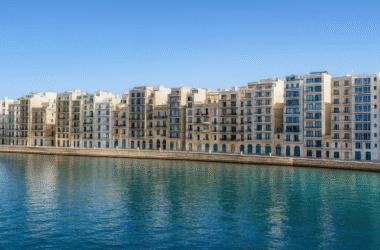When it comes to property ownership, many people assume that it is an annual property tax that they pay for the pleasure of owning a property – think of taxe foncière in France, IMU in Italy, and ejendomsskat in Denmark. This might be true in other countries, but in Malta, there is no annual property tax at all. Instead, taxes only apply during property transactions, such as when you buy, sell, or inherit property.
This guide will walk you through the key aspects of property taxation in Malta, making it simple to understand what taxes you might encounter.
Taxes When Selling Property: Final Withholding Tax
In Malta, selling property is subject to a final withholding tax, which is a flat tax based on the property’s value at the time of transfer. Here are the main rates and exemptions:
- 8% Tax Rate: This is the standard rate applied to most property sales.
- 10% Tax Rate: Applies to properties acquired before 1 January 2004.
- 2% Reduced Rate: Applies to sole residential properties sold within three years of purchase.
- Exemption: Properties that have been owned and occupied for at least three consecutive years can be transferred without paying income tax.
- 5% Reduced Rate: Applies to properties not part of a development project and sold within five years of purchase.
- Inherited Properties: Different rules apply depending on whether the inheritance occurred before or after 25 November 1992.
Taxes When Buying or Inheriting Property: Duty on Documents and Transfers
When you buy or inherit property in Malta, you’ll need to pay duty on documents and transfers, commonly known as stamp duty. The standard rate is 5% of the property’s value, but there are several exceptions and reduced rates:
- First-Time Buyers: Reduced duty on the first €200,000 of the property value.
- Sole Residences: Reduced rates for individuals buying their primary home.
- Donations to Descendants: Lower rates for property transferred within families.
- Gozo Properties: Reduced rates for purchases in Gozo.
- Exemptions: Transfers between spouses are exempt from duty in certain circumstances.
Recent Tax Benefits and Exemptions
To encourage property transactions and the restoration of traditional Maltese properties, recent amendments introduced several incentives:
- First €750,000 Exemptions: Properties meeting certain conditions (e.g., vacant properties, Urban Conservation Areas, or developed using traditional Maltese features) may qualify for tax relief on the first €750,000 of their value.
- Sustainability Incentives: Properties restored or developed according to specific criteria can benefit from exemptions.
However, these benefits don’t apply to:
- Transfers to individuals requiring permits under the Immovable Property (Acquisition by Non-Residents) Act.
- Properties located in Specially Designated Areas (which have separate rules).
Why Understanding Taxation Matters
Knowing how property taxes work in Malta can save you money and ensure compliance with local laws. Whether you’re buying, selling, or inheriting property, understanding the tax system allows you to make informed financial decisions.
For more tailored advice, consider consulting a local expert. Tax rules can be complex, and professional guidance will help you navigate your unique situation with confidence.







